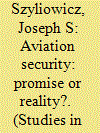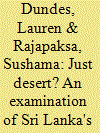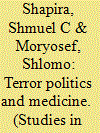|
|
|
Sort Order |
|
|
|
Items / Page
|
|
|
|
|
|
|
| Srl | Item |
| 1 |
ID:
050528


|
|
|
|
|
| Publication |
Jan-Feb 2004.
|
| Summary/Abstract |
This article analyzes the state of aviation security, beginning with the characteristics of the air transportation system that complicate the achievement of a high level of security. It analyzes the situation that existed prior to 9/11 and then evaluates the changes that have occurred since. It concludes that no overall systematic program has yet been put in place to deal with the threats that terrorism poses to the various elements of aviation. It also argues that aviation security, indeed homeland security, requires incorporating antiterrorism into foreign policy and ongoing attempts to deal with the underlying factors that promote terrorism.
|
|
|
|
|
|
|
|
|
|
|
|
|
|
|
|
| 2 |
ID:
050525


|
|
|
|
|
| Publication |
Jan-Feb 2004.
|
| Summary/Abstract |
This study examines the efficacy of various strategies of dissuading state support for terrorism. Libya represents the principle case study employed to test the impact of military force, unilateral economic sanctions, and multilateral economic sanctions against states which provide support to international terrorist organizations. The frequency of Libyan-supported terrorist attacks declined after the application, in 1986, of U.S. unilateral economic sanctions and military force against the regime of Muammar Qaddafi. However, these measures were unable to reduce the lethality of Libyan-supported terrorism, as the number of individuals killed by Libyan terrorism escalated substantially in the years following American airstrikes and sanctions. After the application of multilateral sanctions in 1992, however, Libya essentially dismantled its terrorist support program. In the decade since the imposition of UN sanctions on Libya, the Qaddafi regime has not been linked to a single attack against Americans. The significant economic and political pressures generated by the broadly multilateral sanctions appear to have induced Libya's departure from the ranks of terrorism sponsors.
|
|
|
|
|
|
|
|
|
|
|
|
|
|
|
|
| 3 |
ID:
050527


|
|
|
|
|
| Publication |
Jan-Feb 2004.
|
| Summary/Abstract |
The terrorism of 9/11 elicited a range of different reactions from around the world, including the sentiment that 9/11 was just deserts for America's presence abroad as an unwelcome, overweening world policeman. To help determine the prevalence of this perspective, the authors surveyed a sample of 335 well-educated, English speaking Sri Lankans. Most respondents (73%) thought that the United States brought the 9/11 attack on itself. Reasons for this view included the United States's unilateralism as the only superpower, its involvement in other countries' affairs for its own benefit, and its support for Jews in Israel at the expense of Muslims. Yet the sample's overwhelming sympathy for the U.S. after 9/11 (83%) and to a lesser extent, its anger (52%), as well as agreement regarding the need to punish those who planned and carried out the attack (91%) indicate ambivalence towards the U.S. Implications for how the U.S. should address anti-American attitudes are discussed.
|
|
|
|
|
|
|
|
|
|
|
|
|
|
|
|
| 4 |
ID:
050526


|
|
|
|
|
| Publication |
Jan-Feb 2004.
|
| Summary/Abstract |
Throughout the summer of 2000 United Nations officials, both military and civilian, toiled long and hard to establish "The Blue Line" between Israel and Lebanon. The author, a former UN Military Observer who was part of that process, casts a critical eye over the manner in which the "withdrawal line" was delineated and examines its potential to endure. He concludes by arguing that regional pressures may well conspire against the long term survivability of the Blue Line project and suggests that the time is ripe for the UN to undertake a re-evaluation of its operations in the region.
|
|
|
|
|
|
|
|
|
|
|
|
|
|
|
|
| 5 |
ID:
053064


|
|
|
|
|
| Summary/Abstract |
The ongoing intensive wave of terror assaults against Israel is already approaching its fourth year. The endurance of the Israeli population to this hardship can be attributed, to a certain extent, to proficient leadership. Directing a tertiary university hospital, such as Hadassah, throughout this dire period has required distinctive leadership capabilities. Problems such as staff management during crisis, security, provision of information to the public and media, coping with the clinical routine, teaching and research activities and handling the economic burden, were all aspects of hospital administration that had to be taken care of. We believe that the core issue of medical management in time of terror attacks is establishing the right balance between the specific and peacetime routine. The measures taken to deal with these difficulties can serve as a model of contingency management in the field of medicine as well as other areas.
|
|
|
|
|
|
|
|
|
|
|
|
|
|
|
|
|
|
|
|
|